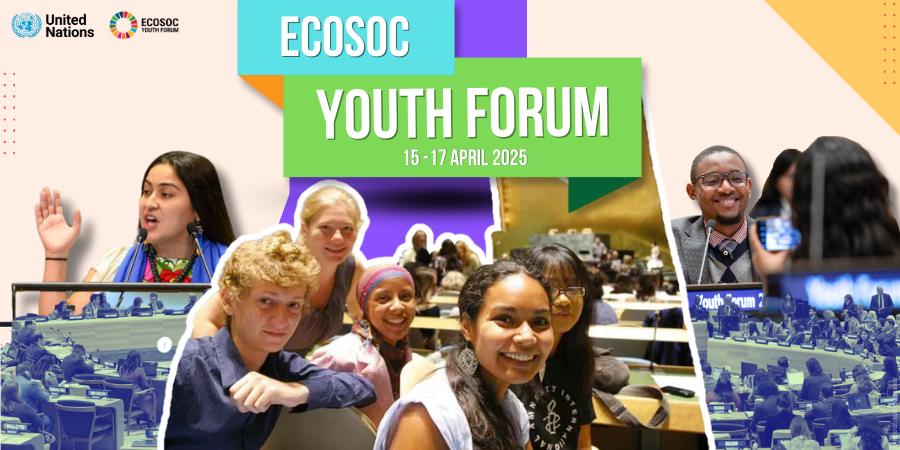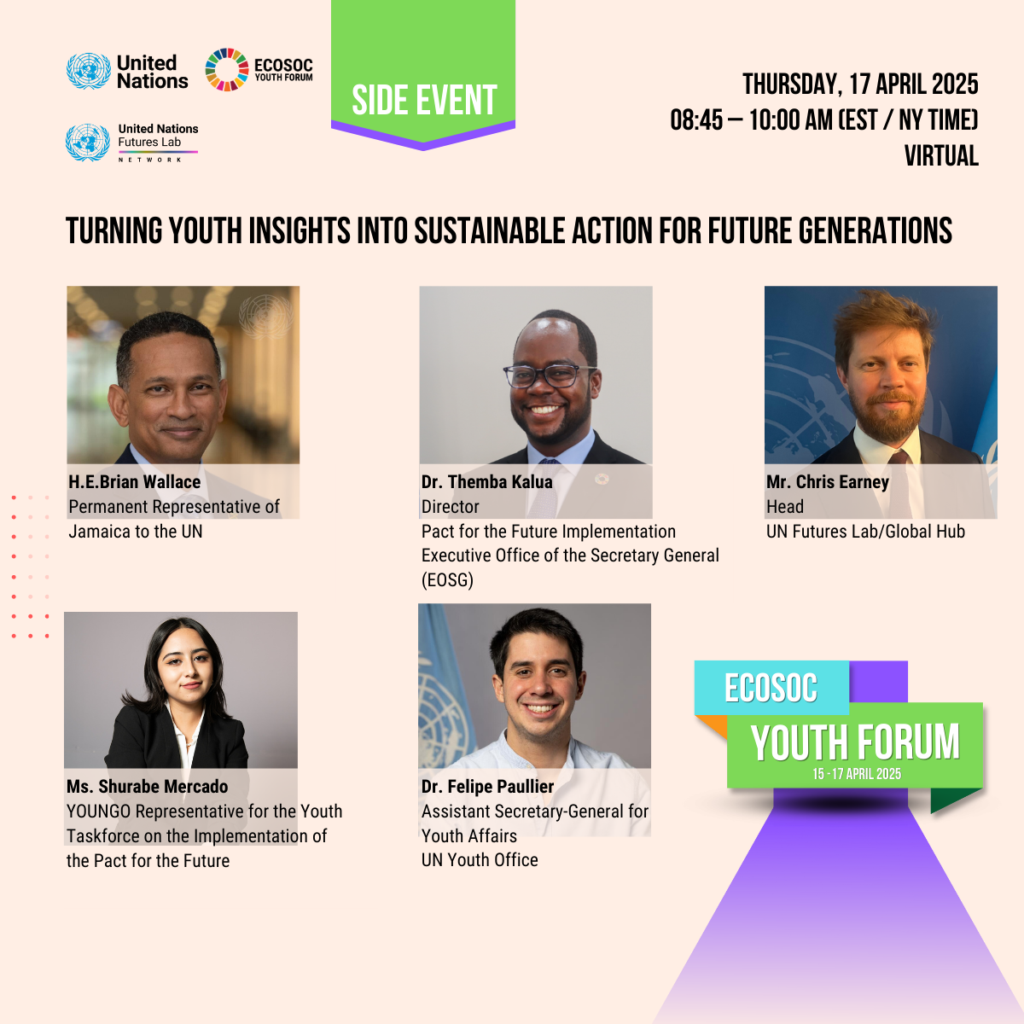ECOSOC Youth Forum 2025: Turning Youth Insights into Sustainable Action for Future Generations




Young people are leading the charge toward a more inclusive, sustainable world. But how do we turn their bold ideas into systems-level action?
The UN Futures Lab/Global Hub and the Executive Office of the Secretary-General (EOSG) co-hosted a dynamic side event on 17 April 2025 at the ECOSOC Youth Forum 2025 guided by the 2025 theme of ECOSOC and the High-level Political Forum (HLPF): “Youth at the Forefront: Leveraging Science and Social Inclusion for Sustainable Development.”
This interactive session brought together youth, policymakers, and changemakers to co-create a future that is truly fit for generations to come.
Speakers
- Mr. Chris Earney, Head, UN Futures Lab/Global Hub
- H.E. Brian Wallace, Permanent Representative of Jamaica to the UN
- Mr. Themba Kalua, Director, Pact for the Future Implementation, Executive Office of the Secretary-General (EOSG)
- Ms. Shurabe Mercado Guido, YOUNGO Representative for the Youth Taskforce on the Implementation of the Pact for the Future
- Dr. Felipe Paullier Olivera, Assistant Secretary-General for Youth Affairs, United Nations Youth Office (UNYO)

A mandate for the future – youth participation matters
At the Summit of the Future on 22 September 2024, the UN General Assembly adopted a Pact for the Future, a Global Digital Compact and a Declaration on Future Generations. Annexed to the Pact, the Declaration defines future generations as “all those generations that do not yet exist, and who will inherit this planet”. It sets out the foundations to safeguard their needs and interests through concrete measures and follow-up mechanisms. These include a greater use of anticipatory planning and foresight, based on science, data and statistics, strengthened systems of national and global accounting, forward-looking and evidence-based impact assessments or better measures of progress on sustainable development within the UN and the multilateral system.
Youth, as critical agents of positive change, already contribute, through their engagement, ideas and networks, to the advancement of peace and security, sustainable development and human rights in their own countries and in the multilateral system. At the UN, we are committed to systematically listen to them, work with them and provide them with meaningful opportunities to shape the future. As the leaders of tomorrow, investing in them and integrating their perspectives in decision-making drive innovative approaches and long-term policies that are future-orientated and sustainable. Their voices are thus essential to define the UN future generations agenda.
Why it matters
Building on the outcomes of foresight activities undertaken by the UN Futures Lab/Global Hub and partners at the UN Civil Society Conference in Nairobi (May 2024) and the UN Summit of the Future Youth Action Day in New York (September 2024), this session explored aspirations and developed actionable recommendations for a tomorrow that is fit for future generations.
This session engaged an intergenerational and multistakeholder group in a participatory foresight exercise using the “Headlines of Tomorrow” across SDGs 3 (health & well-being), 4 (education), 5 (gender equality), 8 (work & economic growth), 13 (climate action), 14 (life below water), 16 (peace, justice & strong institutions), and 17 (partnerships).
By doing so, it bridged youth and leadership insights in realizing the vision for future generations and resulted in practical input to the High-Level Political Forum (HLPF) taking place on Monday, 14 July 2025. This interactive session encouraged participants to actively engage in the foresight exercise and formulate recommended actions across different areas, including to:
- Advance intersectional and multidisciplinary approaches by establishing clear definitions, targets, and indicators to drive progress on overlapping, systemic issues.
- Co-create context-specific solutions with local communities and grassroots actors to address global and local challenges.
- Promote innovation that integrates Indigenous knowledge with science and technology, such as bio-innovation and biomimicry, which are innovations that are modeled after natural systems and processes.
- Transition to a regenerative economy by shifting finance from extractive industries towards youth-led initiatives aligned with the SDGs.
- Centre reparations as a foundation for justice and serve as a mechanism to expand inclusive leadership spaces for marginalized youth.
- Harness youth’s digital fluency and passion for justice to develop and leverage technologies that foster a more interconnected, equitable world.
- Scale collaboration through platforms for intergenerational alliances to influence policies, facilitate exchange of good practices, and fund implementation of youth innovations to support marginalized groups.
- Promote a holistic approach to raise awareness on human and planetary health through formal and informal means, such as public education on gender inclusion or intergenerational dialogues, drawing on scientific information and lived experiences.
- Demonstrate leadership by strengthening youth and women’s meaningful participation in the UN’s institutional practices and decision-making bodies.
- Amplify youth initiatives through recognition of their efforts, representation in decision-making spaces, and resources to drive the reforms they are advocating for.